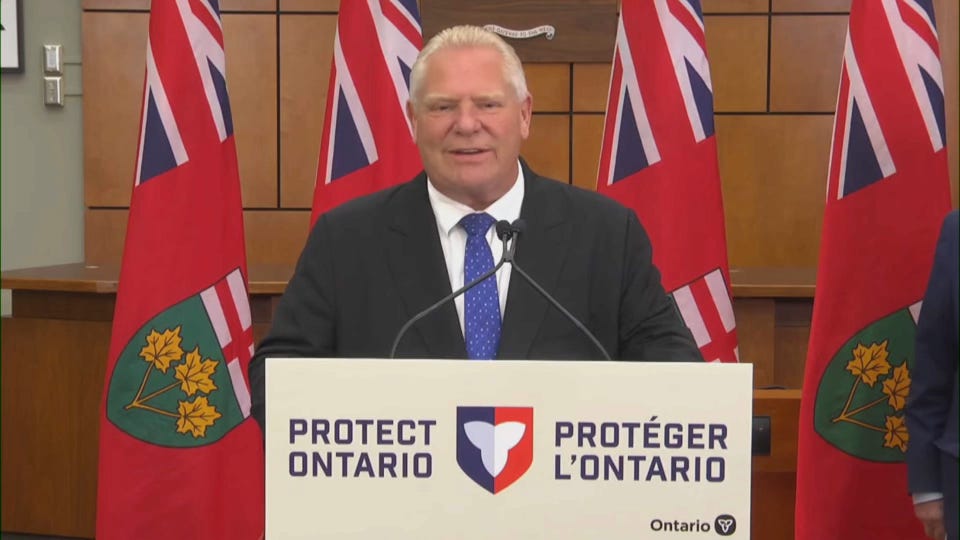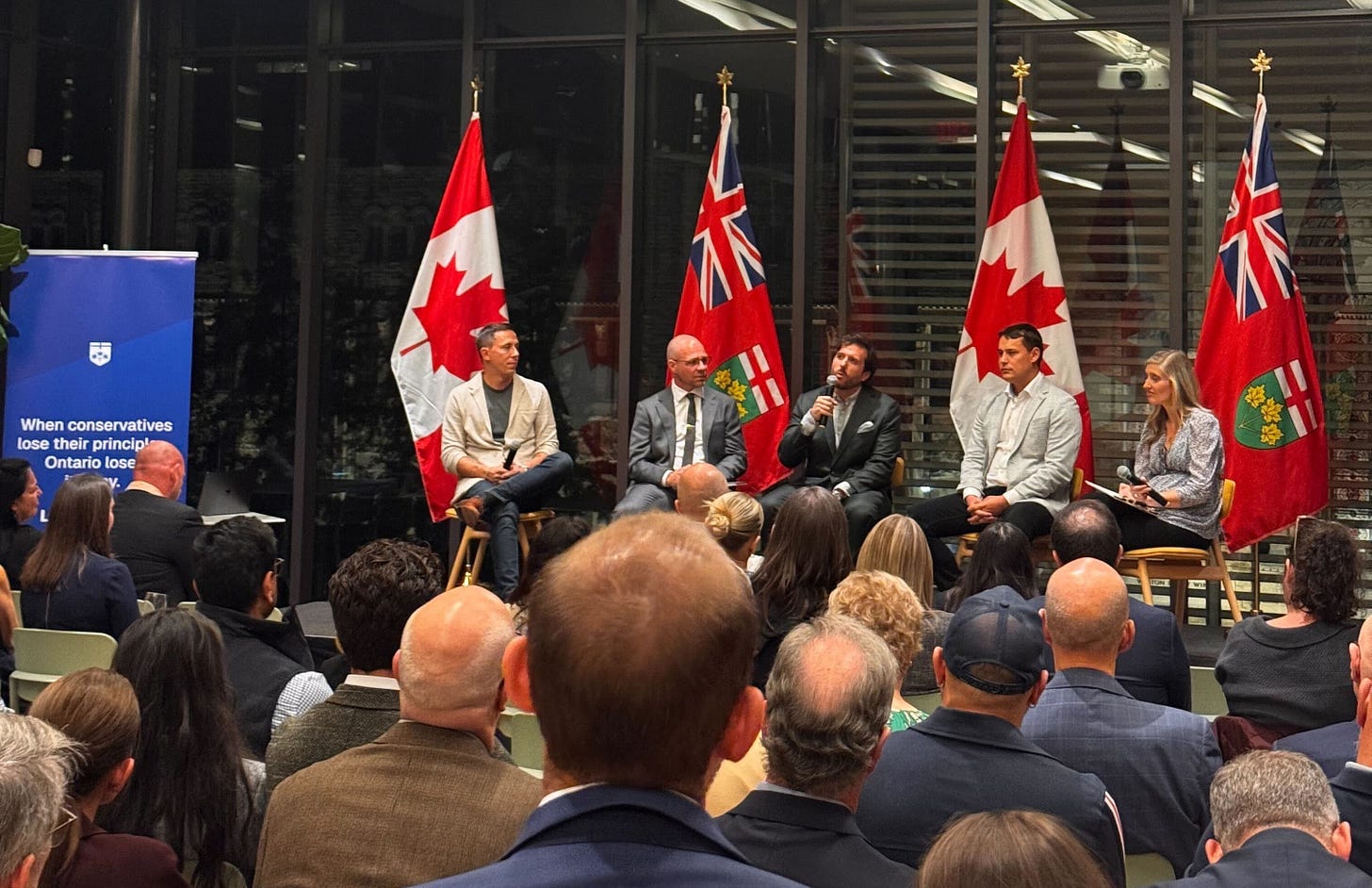Inside The Movement Pushing Doug Ford To Adopt A More Conservative Agenda
I attended the Project Ontario assembly in Toronto Tuesday evening, a gathering of conservatives who want to see Doug Ford’s Progressive Conservatives shift to the right.
On Tuesday, I flew to Toronto to cover a grassroots event called Project Ontario.
The initiative, launched in part by Ontario real estate and tech entrepreneur Matthew Spoke, is urging the Ford government to adopt more conservative policies, including on the economy, education, housing and healthcare.
The project featured several mainstream conservatives as contributors, including National Post columnist Adam Zivo; Alexander Brown of the National Citizens Coalition; political strategist Ariella Kimmel; Brian Dijkema of the Cardus Institute; Toronto real estate developer Chris Spoke (brother of Matthew Spoke); political strategist Ginny Roth; Josh Dehaas of the Canadian Constitution Foundation; Peter Copeland and Tim Sargent of the Macdonald-Laurier Institute; and former Ontario Medical Association president Shawn Whatley.
Project Ontario came about amidst the Ford government running large deficits, accumulating record debt, and embracing elements of the green agenda, and as critics argue they have allowed DEI and gender ideology to go unchecked in the education system, and, in some cases, even promoted the ideologies.
Conservative critics of Ford further point to Ontario’s GDP per capita, which trails every G7 country except Italy, along with worsening housing affordability and rising crime, as evidence that the province is headed in the wrong direction.
It should be noted that despite these criticisms, Ford has won three consecutive majority governments, while federal Conservatives, some of whom are criticizing Ford, have lost four consecutive elections to the Liberals.
Pushback From Ford & His team
The organizers of Project Ontario say it is not a formal organization. It is not the beginning of a new political party, nor a direct challenge to Doug Ford’s leadership. They stress that they are not secretly backing a leadership hopeful waiting to jump in. Rather, their goal is to constructively inspire the government to take a more rightward path.
But that did not stop Ford and his entourage from taking great issue with the event taking place.
Ford and his team were really not happy about this initiative and event. I know this not only from what they’ve said publicly and what others have told me, but also from personal interactions with his people.
On the eve of the gathering, Ford dismissed Project Ontario as a “radical right” group of “yahoos,” a term he had previously used to describe people protesting his lockdowns or breaking his COVID-19 rules.
“We’re prudent fiscal managers. First of all, I’m tough on crime. I’m a prudent fiscal manager. I don’t know who these yahoos are, some radical right group probably tied to maybe a federal party or something,” Ford said.
He had also previously accused the project of being a “right-wing radical group that wants to go after me.”
Ford’s top advisor, Kory Teneycke, downplayed Project Ontario, telling CBC they are “far outside the mainstream of the party” and “far outside the mainstream of the conservative voter coalition.”
Inside The event
Having attended the event, I can say it was neither “radical right” nor a concerted bid to replace Ford.
Such accusations were, in fact, ridiculously unfounded.
Throughout the evening, I and about 135 other attendees heard from several intelligent and reasonable members of the small-c and Big-C conservative movement.
Speakers included project contributors: Adam Zivo, Alexander Brown, Ariella Kimmel, Brian Dijkema, Matthew Spoke, Chris Spoke, Ginny Roth, Josh Dehaas, Peter Copeland, Shawn Whatley, and Tim Sargent.
They were joined by Conservative Member of Parliament Jamil Jivani, Independent Member of Provincial Parliament Bobbi Ann Brady, broadcaster and former Conservative candidate Greg Brady, and banker Sam VanderVeer.
Speakers discussed the challenges Ontario is facing and potential solutions.
Some quotes from panellists that stood out to me included the following:
I. On Economic Growth
“Ontario has not had productivity growth since 2018. The typical Ontarian today is not producing any more than they did seven years ago. We’ve fallen behind not just the U.S., but even behind provinces like British Columbia and Quebec. The fact that Quebec is pulling ahead of Ontario should be very disturbing.”
“Politicians don’t make things happen in the economy. Entrepreneurs do. The government’s role should be to create the right environment, lower taxes, less regulation, and a competitive corporate tax system, so business people can innovate and build the industries of the future.”
“In a zero-sum world, your incentive is to grab a piece, knowing someone else won’t get one. That mindset is hard to change. Moving from redistribution to enablement takes radical change. The vibe needs to shift to one of striving.”
II. On Outward Migration
“In 2018 people were moving to Ontario from the rest of the country. Today, they’re leaving, not only for the U.S., but also for Alberta. There’s something going on in the Ontario economy that is not good and does not bode well for the future.”
“When 25 to 34-year-olds leave, we’re doubling the damage. We’re losing both the people and their potential.”
“We need to be thinking bigger. We need to reset some of the fundamental assumptions of how we regulate and how we attract people.”
III. On Housing & Fertility
“We’re doing worse than Canada on housing, and worse than Canada on productivity growth. The national numbers are bad, and Ontario’s are even worse. On fertility rates, Ontario is also doing worse than the rest of Canada. Canada is already at a record low, and Ontario is even lower. There’s no greater signal of optimism about the future than whether people are willing to have children. This is a powerful problem.”
IV. On Education
“[The education system is] so broken that the number of people opting out is incredible. The stats speak for themselves, as families do whatever it takes.”
“In British Columbia, 13 percent of students attend an independent school. Each one receives 50 percent of tuition paid for by the government, whether in a Jewish school, Montessori, athletic program, or special needs school.”
V. On Leadership
“When you’re looking at managed decline, it’s tempting to let it ride. But it takes courage and fortitude to say we’re going to make this better.”
“The way to do that is by putting forward good arguments, debating, and engaging, trying to change minds. This has been an attempt to inject optimism into a province that has been in decline for some time.”
Now, there was also direct criticism of Ford, but it was in no way out of the ordinary.
For example, Greg Brady noted:
“Ford is great at politicking, not great at governing. And there’s a purpose to putting your name on a ballot and telling your constituents, and telling the province you’re going to be true to your values, be true to your principles, and you’re going to do what you say you’re going to do.”
“I believe that [Poilievre] has principles, and you could disagree with some of them. Anybody that agrees with everybody’s principles all the time… I’ve been married 22 years, you’re going to hash things out. But the struggle is if your husband or wife or boyfriend or girlfriend, or even when you argue with your kids, and you’re like, ‘I don’t know what you believe, I don’t know what you stand for. I don’t even know how to have an argument with you if you don’t put anything on the line.’ And I think that’s what we’re struggling with here in Ontario.”
But that was friendly-fire criticism you expect after seven years in government with the style of governing that Ford has had.
It was not a call to “oust him now.”
My Takeaway
My takeaway from the Project Ontario event is that, as I had personally perceived, Ontario faces many challenges, and this event sought to address some of those concerns from a right-of-centre perspective.
The ideas expressed were not “radical right” or fringe; they were rooted in common sense, sincerity, and concern for the province’s future. That makes me question why Ford and his team would react so defensively and aggressively to them being discussed.
I recently visited Nova Scotia, which has a very moderate Progressive Conservative provincial government. Nova Scotia PCs embrace their style of governance and make convincing arguments for why it is needed in that province.
By contrast, Ford and his team seem to prefer attacking those who bring up criticisms of their governance instead of making the case for their own approach.
Ford has won three majorities in Ontario, which gives him the right to govern as he sees fit. That said, he should be able to explain himself rather than simply attack fellow conservatives who offer constructive criticism.
To me, the way Ford and his team chose to react by smearing Project Ontario “radical right” did not reflect well on them. As Project Ontario takes its next steps, I hope they will rethink how they have handled this and instead actually consider some of the very good ideas put forward by the contributors.
Some of the quotes were edited for clarity.
PUBLISHER’S NOTE: Matthew Spoke is a founding donor of EMCN Media and partially covered travel expenses related to my attendance at this event. That said, this article was produced independently, is not sponsored content or paid advertising, and was not provided as a service or condition of his financial support.



